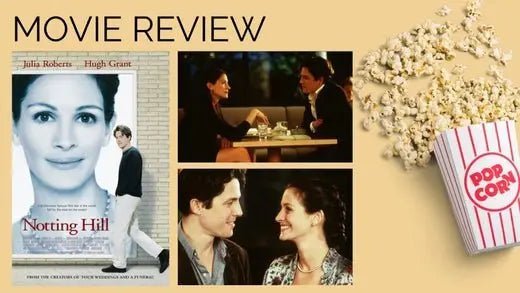
Movie Review: Notting Hill (1999)
Share
“Notting Hill,” directed by Roger Michell and written by Richard Curtis, is a quintessential romantic comedy that has charmed audiences since its release in 1999. Set in the picturesque London neighborhood of Notting Hill, the film tells a heartfelt and humorous tale of love, fame, and the challenges of bridging two seemingly incompatible worlds. Starring Julia Roberts as the glamorous Hollywood actress Anna Scott and Hugh Grant as the unassuming bookstore owner William Thacker, “Notting Hill” remains a timeless exploration of romance, identity, and vulnerability.
The film’s narrative unfolds with a delightful blend of humor, charm, and poignancy. The plot’s central conceit—an ordinary man falling in love with a global superstar—is engaging and filled with moments that feel both aspirational and grounded. The meet-cute, involving a spilled orange juice incident, is perfectly executed, setting the tone for a relationship filled with awkward yet endearing moments.
One of the film’s greatest strengths is its pacing. The story balances the highs of romantic euphoria with the lows of heartbreak and misunderstanding, creating a rhythm that keeps viewers invested. The subplots, such as William’s interactions with his quirky group of friends, enrich the narrative by providing comedic relief and grounding the story in relatable, everyday experiences.
While the film’s charm is undeniable, certain aspects of the plot can feel overly predictable. As with many romantic comedies, “Notting Hill” leans heavily on tropes such as the grand romantic gesture and the inevitable reunion after a dramatic misunderstanding. Some viewers may find the lack of narrative risks or surprises detracts from its overall impact.
Additionally, the film’s resolution, while satisfying, can feel rushed. The final scenes wrap up the characters’ arcs neatly, but the simplicity of the resolution might leave some viewers yearning for a more nuanced exploration of the complexities introduced earlier.
At its core, “Notting Hill” is a story about love transcending social and personal barriers. The film examines themes such as:
-
Fame and Normalcy: Anna’s struggles with the pressures of fame contrast with William’s quiet, uneventful life, highlighting the challenges of finding common ground between two disparate worlds.
-
Vulnerability and Authenticity: Both protagonists grapple with their insecurities. Anna, despite her glamorous image, reveals her loneliness and desire for genuine connection. William’s self-doubt underscores the difficulty of believing oneself worthy of extraordinary love.
-
Community and Support: The presence of William’s eccentric friends and family symbolizes the importance of a strong support system, offering levity and wisdom as he navigates his relationship with Anna.
Symbolically, the neighborhood of Notting Hill itself represents a haven of charm and simplicity amid the chaos of celebrity life. The blue door of William’s home becomes a visual motif for stability and intimacy, juxtaposed with the transient, public nature of Anna’s world.

-
Anna Scott (Julia Roberts): Anna is a nuanced portrayal of a woman balancing public adoration and private longing. Roberts infuses her character with vulnerability, making her relatable despite her superstar status. Anna’s moments of candidness, such as the iconic line, “I’m just a girl, standing in front of a boy, asking him to love her,” reveal her yearning for normalcy and love.
-
William Thacker (Hugh Grant): William is the quintessential everyman, brought to life with Hugh Grant’s signature charm and awkward humor. His journey from self-deprecating humility to bold romanticism is compelling, making him an ideal counterpart to Anna’s larger-than-life persona.
-
Supporting Characters: The ensemble cast—including Rhys Ifans as the hilariously oblivious Spike and Emma Chambers as the sweetly eccentric Honey—provides comedic relief and depth. These characters ground the story, emphasizing the importance of community in navigating life’s challenges.
“Notting Hill” is a delightful romantic comedy that continues to resonate with audiences due to its charming performances, witty script, and heartfelt exploration of love and identity. While it adheres to familiar genre conventions, its sincerity and humor elevate it above many of its contemporaries. With memorable characters and enduring themes, the film remains a classic example of romantic escapism done right. For anyone seeking a feel-good movie with genuine heart, “Notting Hill” is an enduring must-watch.